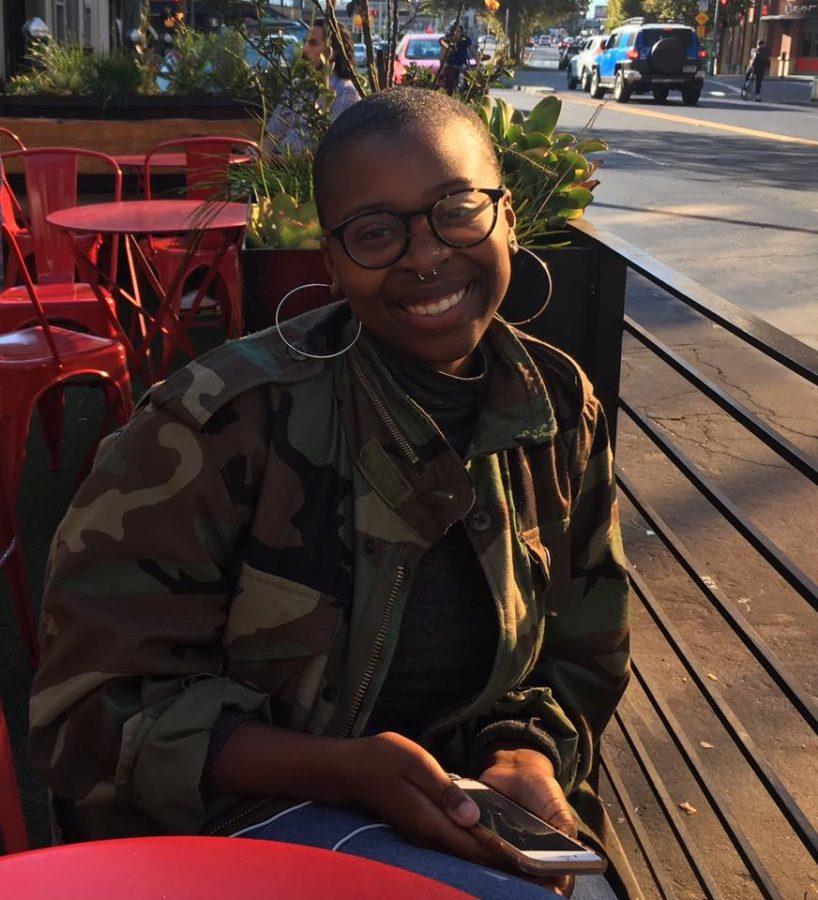Off the Cuff: Zoé Samudzi, Medical Sociology Ph.D. Candidate
Zoé Samudzi is a Medical Sociology Ph.D. student who focuses her work on transgender peoples’ ability to access health care
February 17, 2017
Zoé Samudzi is a Medical Sociology Ph.D. student at the University of California, San Francisco, where she specializes in issues related to transgender people’s impediments to receiving adequate health care. Aside from policies and oppression related to transgender people, Samudzi has also conducted research related to race, sex workers and communities that suffer from HIV. Her talk is titled, “Conceptualizing Oppression: Umbrellas and Webs,” during which she will discuss how political systems affect transgender peoples’ access to health care. The talk today will be held at 5 p.m. at Wilder Hall, Room 101.
This interview has been edited for length and clarity.
What is your lecture going to be on tomorrow?
At first I was going to talk about trans health, because it’s my focus, but I think it would be more useful to contextualize trans health in these larger systems of oppression, and in doing that, help people understand the ways in which our identities as oppressed people and as oppressors can be fluid in ways that make us complicit in oppression and ignore that oppression. I wanted to set the stage for that and talk about how these things impact trans communities.
Your talk is about racial capitalism. What does that term mean?
People often talk about capitalism and class structures, but they don’t talk about the ways poverty is racialized. Or the ways the American political system was built on the genocide of indigenous people and the enslavement of African people. Racism is intrinsic to this system we have, and I want to make sure that’s very clear in my talk.
What did you mean about fluidity and complicity in oppression?
For example, I’m talking about trans folks and health. I’m a Black queer woman, I’m oppressed on the basis of my queerness, my Blackness and my womanhood, but I’m a cis woman. So my body and identity are privileged within that kind of structure of knowing gender and identity that places my body as normal and trans bodies as abnormal. As an academic, it means I have tremendous power to define how I understand trans people to live in the world and exist in the world. I have access to these dominant discourses, and I can perpetuate the structural oppressions to trans people in the work that I do.
What are the ways you think you can reduce that oppression?
What I’m interested in doing is working around discourses in the academy, and looking at the ethics and ways we do research as cis folks. For me, that means making research design that is really participatory and highlights the ways communities articulate their needs, as opposed to satisfying my own questions and biases.
How did you get interested in the field and studying health care for trangender people?
I was trying to figure out the fieldwork for my master’s degree, and I was doing a program in South Africa [with] a sex-worker education and advocacy group. I was interested in working with the trans-women sex workers who were there, and the more I talked to them, the more I became keenly aware of my own obligations to help the community as a cis person.
Do you think in recent years there’s been enough increased awareness about rights for trans folk to make you con dent in things getting better down the line?
No, and I wish I could be more confident in saying I did. I think it’s amazing we have fantastic folks like Laverne Cox and Janet Mock being Black women, trans and out in public while being unapologetic. But at the same time, as with any group that’s gaining visibility in the civil rights space, there’s a tremendous amount of pushback. Now you have Donald Trump saying he has every intention to roll back whatever little access to civil rights that trans folks have.
I was recently at the World Professional Association for Transgender Health, and they invited Kenneth Zucker to present there, a guy who is a proponent of reparative therapy. His main clients are the parents of trans kids who want their kids to not be trans. Even though his work has been discredited, WPATH still gave him space to legitimize what is ostensibly child abuse. So maybe we do have more visibility for trans people, but visibility doesn’t mean much if it’s not being supported by material systems. I want to say things are getting better, but I know way too many girls in prison who are just getting beaten up on a regular basis to feel any confidence to say that.
What are the main issues you’d like to fix about health care for transgender people?
One of the big problems when it comes to health care is that there are only a handful of medical schools that are explicit about teaching doctors how to give care to trans folks. One issue that drives community health disparities is that people will anticipate transphobia and then just won’t go to the doctor. So it’s not about ‘let’s have gender-sensitivity training,’ it’s about having a whole medical understanding of what do people mean when they say ‘I am a trans person,’ and then how do you ask questions to further what their needs are.
Are you pretty sure Trump will roll back the rights for transgender people? What kind of policies could he take away?
With public health and health insurance, people can get gender-reconstructive surgeries covered by medical insurance. If that insurance gets chipped away, what is people’s access to hormones and to surgeries going to look like? Because they’re really expensive, and if they don’t have private insurance what will they do?
What’s the main theme you hope to get across in your talk?
The main message I want to get across is that Trump is a problem, but he’s not the only problem. We always talk about impeachment and that stuff, but we’re not properly recognizing what would happen. Trump gets impeached, then we get Mike Pence, who is appalling, then you have Paul Ryan, and everyone in the government is appalling. We shouldn’t be focusing on a single figurehead of a larger problem even though we’re focused on him being very monstrous.


























